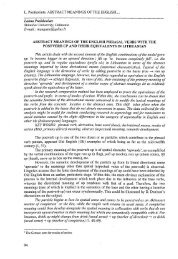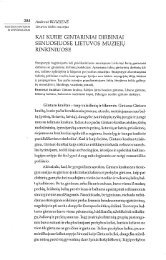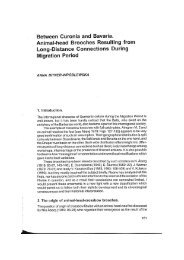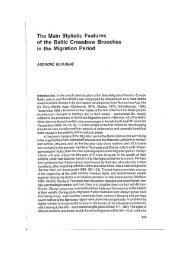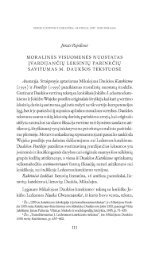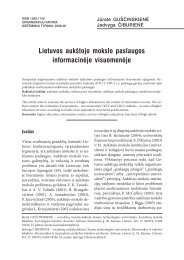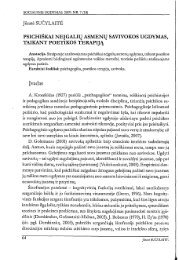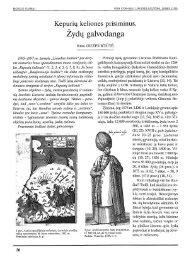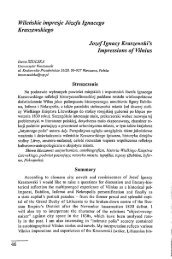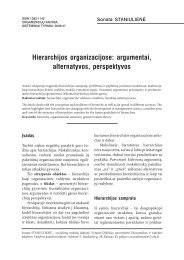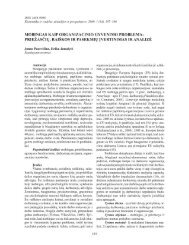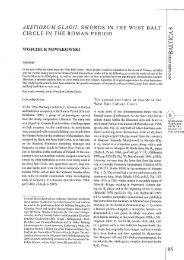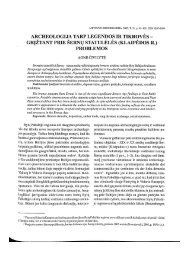ECO-MARKETING AND ECO-LABELLING: DOES IT ENSURE ...
ECO-MARKETING AND ECO-LABELLING: DOES IT ENSURE ...
ECO-MARKETING AND ECO-LABELLING: DOES IT ENSURE ...
You also want an ePaper? Increase the reach of your titles
YUMPU automatically turns print PDFs into web optimized ePapers that Google loves.
D.Grundey 177 ISSN 1648 - 4460<br />
Conclusions<br />
Researching Customer Loyalty in Lithuania<br />
Implementing a philosophy of sustainability in the practice of marketing would<br />
require businesses to become more sensitive to the efficient use of all resources over a longer<br />
period. Marketers should be encouraged to assess the cost of new laws and regulafions, the<br />
cost of endless lifigafion, and the potential loss of competitive position(s) as integral and<br />
critical components of an ecological approach, which is broadly discussed and substantiated<br />
in this article.<br />
A broad scope of evidence brought to the reader from European and American<br />
countries prove that eco-marketing and eco-labelling is a natural process, which is not only<br />
broadly discussed by the scholars but also is broadly applied in the practice by businesses.<br />
The application of ecological standards in growing crops and raising animals, as well as the<br />
production process might be considerably costly and economically not viable, but consumers'<br />
preferences for safer and ecologically-produced substances arc growing, which leaves modem<br />
business aspiring for a more profitable future.<br />
The adoption of ISO standards in foodstuffs' producfion and farming pracfices is the<br />
code of good practice, which is world-wide acceptable in various business sectors, starting<br />
with food industry and finishing with services, such as hotel and tourism industry, etc. A mini<br />
case of Lithuania also indicates that the country has adopted the eco-labelling policy,<br />
following the EU directives and national inifiatives.<br />
Accoridng to the survey, performed in 2007-2008, the Lithuanian respondents have<br />
summarised that the most influential factors for their loyalty towards eco-products in the<br />
country are:<br />
1) increase of personal income;<br />
2) lower prices for eco-products anf eco-processed foods;<br />
3) informing and educating the society;<br />
4) more advertising.<br />
Lithuanian respondents, as opposed to consumers of the EU countries, the USA and<br />
Canada, did not mention that their purchasing decisions of eco-products could be influenced<br />
by fad, growing popularity and propaganda. The main de-motivators of buying eco-products<br />
in Lithuania are: a) high prices; b) low availability and c) doubts about the authenticity of ecocertification.<br />
Referenccs<br />
Allenby, B. R. (1991). SSA Journal, September, pp. 5-9.<br />
Bergen II. von (1990). New Afarkcting. Die Zukunft inszenieren, Freiburg im Breisgam.<br />
Brauers, W.K.M., Ginevičius, R., Zavadskas, E.K., Antuchevičienė, J. (2007), "The European Union in a<br />
Transition Economy", Transformations in Business & Economics, Vol. 6, No 2(12), pp. 21-37.<br />
Burinskienė, M., Rudzkicnė, V. (2009), "Future Insights, Scenarios and Expert Method Application in<br />
Sustainable Territorial Planning", Technological and Economic Development of Economy. Baltic Journal<br />
on Sustainability, Vol. 15, No 1, pp. 10-25.<br />
Castenow D. (1993). New Marketing in der Praxis, <strong>ECO</strong>N ExecutiveVerlags, Dusseldorf.<br />
Coddington, W. 1993. Environmental Marketing. New York: McGraw-Hill.<br />
Cohen, D. S. (1991). 'The Regulation of Green Advertising: The State, the Market and the Environmental<br />
Good,' University of British Columbia Law Review, pp. 226 - 275.<br />
Czinkota, M. & Ronkainen, I. (1992). „Global Marketing 2000: A Marketing Survival Guide", Marketing<br />
Management, 1 (1), pp. 36-45.<br />
ENDS (1989). Eco-Labels: Product Management in a Greener Europe, London: Environmental Data Services.<br />
Frankel, C, (1992). ..Blueprint for Green Marketing", Marketing Executive Review, 2 (5), p. 22-23.<br />
Frause, U. & Colchour, J. (1994). The Environmental Marketing Imperative. Chicago: Probus Publishing.<br />
Friedman, F. B. (1992). „The Changing Role of the Environmental Manager". BusinessHorizons. March-April,<br />
ni-íN.UXmíATION.'í IN ;it;.r/i\'f;,l-,r c~ nCONOMlCS, Vol 8, No 1 (16), 2009



